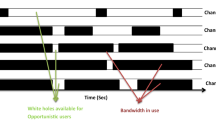Abstract
In this paper, we investigate the channel access problem considering switching cost in the block fading channels with unknown information of channel occupation and quality. We formulate this problem as a multi-armed bandit (MAB) problem with the goal of minimizing the outage rate and avoiding frequent channel switching. To achieve this goal, a block based multi-armed bandit (BMAB) learning algorithm is proposed. Furthermore, the BMAB algorithm is extended to cope with the short-term deep channel fading, by exploiting the repetition time diversity (RTD). The regrets of the proposed two algorithms are proved to be logarithmic in time. Performance analysis and simulation results show that the proposed algorithms outperform standard SMAB algorithm in average system outage rate, switching cost and throughput. In addition, the repetition time diversity multi-armed bandit (RTDMAB) algorithm is better than BMAB algorithm in the presence of deep channel fading at the cost of receiving complexity .





Similar content being viewed by others
References
Mitola, J., & Maguire, G. Q. (1999). Cognitive radio: Making software radios more personal. IEEE Personal Communications, 6(4), 13–18.
Haykin, S. (2005). Cognitive radio: Brain-empowered wireless communications. IEEE Journal on Selected Areas in Communications, 23(2), 201–220.
Liang, Y. C., Zeng, Y., Peh, E. C. Y., & Hoang, A. T. (2008). Sensing throughput tradeoff for cognitive radio networks. IEEE Transactions on Wireless Communications, 7(4), 1326–1337.
Jiang, H., Lai, L., Fan, R., & Poor, H. V. (2009). Optimal selection of channel sensing order in cognitive radio. IEEE Transactions on Wireless Communications, 8(1), 297–307.
Quan, Z., Cui, S., Sayed, A. H., & Poor, H. V. (2009). Optimal multiband joint detection for spectrum sensing in cognitive radio networks. IEEE Transactions on Signal Processing, 57(3), 1128–1140.
Fan, R., & Jiang, H. (2009). Channel sensing-order setting in cognitive radio networks: A two-user case. IEEE Transactions on Vehicular Technology, 58(9), 4997–5008.
Zhang, R., Cui, S., & Liang, Y.-C. (2009). On ergodic sum capacity of fading cognitive multiple-access and broadcast channels. IEEE Transactions on Information Theory, 55(11), 5161–5178.
Fan, R., & Jiang, H. (2010). Optimal multi-channel cooperative sensing in cognitive radio networks. IEEE Transactions on Wireless Communications, 9(3), 1128–1138.
Fan, R., Jiang, H., Guo, Q., & Zhang, Z. (2011). Joint optimal cooperative sensing and resource allocation in multichannel cognitive radio networks. IEEE Transactions on Vehicular Technology, 60(2), 722–729.
Lai, L., El Gamal, H., Jiang, H., & Poor, H. V. (2011). Cognitive medium access: Exploration, exploitation, and competition. IEEE Transactions on Mobile Computing, 10(2), 239–253.
Gao, S., Qian, L., Vaman, D. R., & Han, Z. (2010). Distributed cognitive sensing for time varying channels: Exploration and exploitation. In Proceeding on IEEE wireless communications and networking conference.
Fang, X., Yang, D., & Xue, G. (2013). Taming wheel of fortune in the air: An algorithmic framework for channel selection strategy in cognitive radio networks. IEEE Transactions on Vehicular Technology, 62(2), 783–796.
Anandkumar, A., Michael, N., Tang, A. K., & Swami, A. (2011). Distributed algorithms for learning and cognitive medium access with logarithmic regret. IEEE Journal on Selected Areas in Communications, 29(4), 731–745.
Auer, P., Cesa-Bianchi, N., & Fischer, P. (2002). Finite-time analysis of the multiarmed bandit problem. Machine Learning, 47, 235–256.
Cao, B., et al. (2014). Cooperative media access control with optimal relay selection in error-prone wireless networks. IEEE Transactions on Vehicular Technology, 63(1), 252–265.
Cao, B., et al. (2015). Dynamic cooperative media access control for wireless networks. Wireless Communications and Mobile Computing, 15(13), 1759–1772.
Li, Y., et al. (2011). A distributed cooperative MAC for cognitive radio ad-hoc networks. In IEEE symposium on computers and communications (ISCC).
Li, Y., et al. (2015). Cooperative spectrum sharing with energy-save in cognitive radio networks. In IEEE global communications conference (GLOBECOM).
Li, B., Yang, P., Wang, J., et al. (2012). Optimal action point for dynamic spectrum utilization under Rayleigh fading. Ad Hoc & Sensor Wireless Networks, 17(1–2), 1–32.
Sabharwal, A., Khoshnevis, A., & Knightly, E. (2007). Opportunistic spectral usage: Bounds and a multi-band CSMA/CA protocol. IEEE/ACM Transactions on Networking, 15(3), 533–545.
Du, Z., Wu, Q., & Yang, P. (2014). Learning with handoff cost constraint for network selection in heterogeneous wireless network. Wireless Communications and Mobile Computing. doi:10.1002/wcm.2525.
Xu, Y., Anpalagan, A., Wu, Q., Shen, L., Gao, Z., & Wang, J. (2013). Decision-theoretic distributed channel selection for opportunistic spectrum access: Strategies, challenges and solutions. IEEE Communication Survey & Tutorials, 15(4), 1689–1713.
Huang, J., Gan, X., & Feng, X. (2013). Multi-armed bandit based opportunistic channel access: A consideration of switch cost. In Proceeding on IEEE ICC.
Agrawal, R., Teneketzis, D., & Anantharam, V. (1988). Asymptotically efficient adaptive allocation rules for the multiarmed bandit problem with switching. IEEE Transactions on Automatic Control, 33(10), 899–906.
Chen, L., Iellamo, S., & Coupechoux, M. (2011). Opportunistic spectrum access with channel switching cost for cognitive radio networks, In Proceeding on IEEE ICC.
Jun, T. (2004). A survey on the bandit problem with switching costs. De Economist, 152(4), 513–541.
Qin, Z., et al. (2015). Multiple armed bandits based opportunistic channel access with switching cost in block fading channel. In 2015 international conference IEEE wireless communications & signal processing (WCSP).
Chen, D., Yin, S., Zhang, Q., Liu, M., & Li, S. (2009). Mining spectrum usage data: A large-scale spectrum measurement study. In ACM MOBICOM (p. 13C24).
Caire, G., & Tuninetti, D. (2001). The throughput of hybrid-ARQ protocols for the Gaussian collision channel. IEEE Transactions on Information Theory, 47(5), 1971–1988.
Wang, J., Young Park, S., Senior, D. J. L., & Zoltowski, M. D. (2010). Throughput delay tradeoff for wireless multicast using hybrid-ARQ protocols. IEEE Transactions on Communications, 58(9), 2741–2751.
Acknowledgements
This work is supported in part by the National Natural Science Foundation of China under Grant Nos. 61401508 and 61601490.
Author information
Authors and Affiliations
Corresponding author
Rights and permissions
About this article
Cite this article
Qin, Z., Wang, J., Chen, J. et al. Opportunistic channel access with repetition time diversity and switching cost: a block multi-armed bandit approach. Wireless Netw 24, 1683–1697 (2018). https://doi.org/10.1007/s11276-016-1428-3
Published:
Issue Date:
DOI: https://doi.org/10.1007/s11276-016-1428-3




